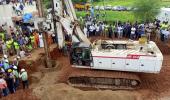Little seems to have changed more than a decade after the Supreme Court issued guidelines on preventing accidents of people, mostly small children, falling into abandoned borewells and tube wells.

The issue has come into the limelight again with the rescue of 11-year-old Rahul Sahu, who was pulled out from a 80 feet borewell in Chhattisgarh's Janjgir Champa district on Tuesday after a 104-hour-long operation.
Six-year-old Rithik of Punjab's Hoshiarpur, however, was not so lucky.
On May 23, Rithik was declared dead at a hospital after being rescued from a 300 feet borewell in a seven-hour-long operation.
The guidelines issued by the top court on February 11, 2010 included setting up barbed wire fencing around the well during construction, using a steel plate covers fixed with bolts over the well assembly and filling up of borewells from the bottom to the ground level among others.
These were issued a year after a bench led by the then CJI K G Balakrishnan took suo motu cognisance of a letter petition bringing to its notice a spate of such accidents in the country on February 13, 2009.
The top court had also asked the authorities to give wide publicity to its order.
"It has been brought to the notice of this court that in a number of cases, children had been trapped and fallen into borewells and tube wells or abandoned wells. These reports have been coming from various states. Accordingly, we took suo motu initiative and issued notice to the various states to take immediate measures to prevent such kind of incidents," the top court had said in its order dated February 11, 2010.
The top court had said that the owner of the land or the premises, before taking any steps to construct borewells or tube wells, must inform in writing at least 15 days in advance to the authorities concerned in the area such as the district collector or district magistrate or sarpanch, or officers concerned of the department of ground water or public health or municipal corporations, as the case may be.
It had directed that registration of all drilling agencies, government, semi-government or private, should be mandatory.
"Erection of a signboard at the time of construction near the well with the following details: (a) Complete address of the drilling agency at the time of construction or rehabilitation of well, (b) Complete address of the user agency or owner of the well," it had said.
The top court had also directed that barbed wire fencing or any other suitable barrier be erected around the well during construction, a cement or concrete platform measuring 0.5x0.5x0.6 metre (0.30 metre above ground level and 0.30 metre below ground) built around the well casing and the well assembly capped using welded steel plates or a similar cover fixed with bolts.
It had said that in case of a pump repair, the tube well should not be left uncovered and mud pits and channels should be filled after completion of the work.
"Fill up abandoned borewells by clay/sand/boulders/pebbles/drill cuttings etc. from bottom to ground level," the top court had said, adding that on completion of drilling operations at a particular location, the ground conditions are to be restored to what it was before the drilling.
"The guidelines above mentioned shall be given wide publicity through national television channels. A copy of this order be sent to the chief secretaries of all the states/union territories who shall forward the same to the district collectors of all districts of their respective state," the bench said.
On August 6, 2010, a three-judge bench led by the then CJI S H Kapadia had slightly modified the February 11, 2010 order and disposed of the petition while directing that a district/block/village wise status of all borewells and tube wells (abandoned or operational) should be maintained at the district level.
It had said that in rural areas, the monitoring is to be done through the village sarpanch and an executive from the agriculture department. In urban areas, it has to be done by the junior engineer and an executive from the department concerned with ground water or public health or municipal corporation.
With cases of children falling into uncovered borewells and tube wells continuing unabated, on February 3, 2020, the top court agreed to hear a writ petition filed by advocate G S Mani, who sought action against the authorities for failing to prevent such accidents.
The top court has sought responses from the Centre and all the states and union territories on compliance of its 2010 order.
As per the apex court website, the writ petition is scheduled to be listed on July 13 after a gap of more than two years.










